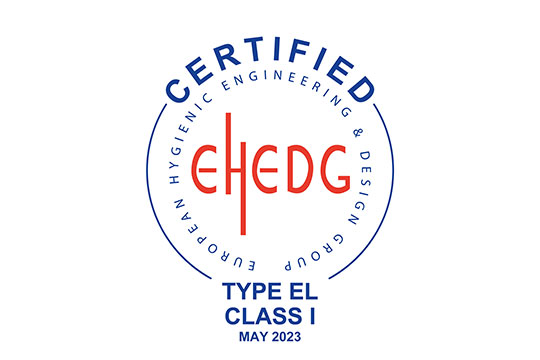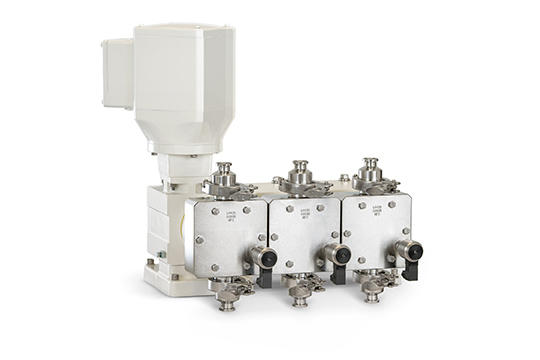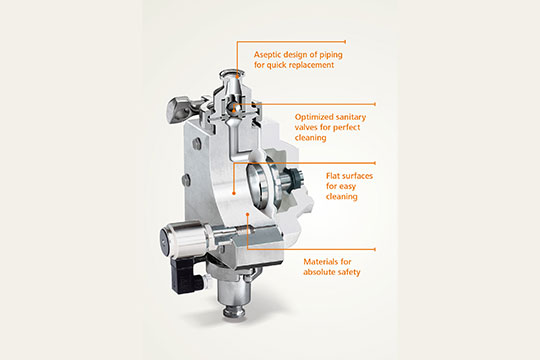Especially in the food processing and pharmaceutical industries, media must be conveyed particularly gently. At the same time a high degree of recipe accuracy must be maintained. In addition, like all system components, the pumps used must support integrated cleaning compatibility (CIP/SIP) in order to prevent product contamination in the process. These requirements can now also be found among producers in the fine chemicals industry, who manufacture raw or intermediate products for the food and pharmaceutical sectors, for example. For this reason, pump expert LEWA applied for EHEDG certification for the tried-and-tested ecodos hygienic metering pump. Since mid-2023, the LEE pump size has been the only motor-driven oscillating diaphragm metering pump with this certificate. This makes the ecodos series more attractive for European clean market projects in food production and is also relevant for OEMs and EPCs that supply to regulated industries and list EHEDG compliance in their specifications.
"In the case of pumps that are used in food processing and pharmaceutical production, for example, users expect an economical solution that is easy to maintain and has low life cycle costs," said Dr. Hans-Joachim Johl, Lead Product Manager Life Sciences/Clean Processes at LEWA. "In addition, the process technology should also be able to present certain European-wide legal certificates of conformity for the polymers that come into contact with the product in order to prove their suitability for the sensitive conditions in these areas." For example, European Regulations 1935/2004 and 10/2011 are relevant for polymers in contact with the product. The suitability of operating, assembly and processing additives for use with food can be certified via NSF H1 and AOF (Animal Origin Free), for example. The EHEDG EL Class 1 certificate, on the other hand, is a decisive proof of quality with regard to cleanability of equipment. It certifies good inline cleaning without disassembly and therefore differentiates the pump to alternative pump solutions. Since producers of raw products for food and pharmaceutical production are requiring it more and more frequently, LEWA and its proven ecodos diaphragm metering pump have taken and passed the cleaning compatibility test.
"The main advantage of the pump for use in these 'clean industries' is its design. The shaft seal-free oscillating diaphragm pump is hermetically tight in both directions," explained Dr. Johl. "This applies from both the product side to the operator, for example when using hot alkaline cleaning media or critical process fluids, and the production environment to the process fluid: when using the pumps in aseptic processes, for example." A leakage-monitored multi-layer safety diaphragm is used to ensure functionality and separation from the process environment – even in case of a malfunction. The ideal service life of this diaphragm is around 16,000 operating hours (depending on the frequency of thermal stress caused by CIP/SIP applications), which corresponds to two years of continuous use. Even if the diaphragm in contact with the product is damaged, the relevant production step can be safely completed without interruption.
Cleaning and hold-up optimization for the highest hygiene standards
To ensure good cleaning compatibility, which can be achieved through consistent compliance with the EHEDG design guideline, the pump head of all ecodos-hygienic variants is geometrically designed such that there are virtually no gaps or dead spaces. This means that no process or cleaning media residue can accumulate. In addition, the process fluid volume in the working chamber is kept low thanks to the "hold-up-optimized" design of the pump head. Rinsing, emptying or drying processes, such as flowing through warm sterile air, can therefore be carried out easily and quickly. The pump head is made of electropolished stainless steel with a surface roughness of < 0.5µm to ensure that the stringent hygiene requirements are also met on the design side. This ensures the improved cleaning compatibility of the product-wetted surfaces. A version in other materials like Hastelloy is also available as an option. Various valve designs are available for the stainless steel pump heads; in other words, the valves themselves are selected to suit the fluid in question.
"DIN 1.4435 stainless steel is the optimal and typical choice for most EHEDG-specified requirements," explained Dr. Johl. "The pump heads made from this material are ideal for pressures of up to 20 bar, media temperatures of 80 °C and short-term SIP temperatures of up to 130 °C." However, if the temperature and pressure requirements are less stringent, a plastic PP version is a more cost-effective alternative. It is ideal for corrosive salt and buffer solutions, particularly in the biopharmaceutical environment. A CIP step with typically 1n NaOH as an alkaline cleaning agent can be considered here.
Modular design increases flexibility and application diversity
Only energy-efficient IEC motors or fanless servomotors are used as drives, which are mounted vertically to save space: Spring-cam drive units are used in smaller ecodos models, while variable eccentric drives are used for higher outputs. Depending on the size, one single-drive unit per pump head can convey from 0.4 to 1,500 l/h. “The drive unit housing is sealed off from the drive unit such that when replacing the pump head, no oil can escape. Combining several pump heads with one drive train opens up further possible applications," said Dr. Johl. Multiplex pumps, for example, are suitable for recipe metering and mixing tasks. When they are used, the respective pump heads can be precisely adapted to the recipe-specific quantities.
In terms of control, the use of a servomotor and an intelligent control system also enable different customer-side requirement profiles to be implemented and the adjustment range to be extended up to 1:200. Traditionally, the metering flow can be adjusted via the stroke length and the frequency of an inverter. In newer concepts, the speed of a fanless synchronous motor or PMSM (permanent magnet synchronous motor) is variable and operating points can be approached precisely without manual stroke adjustment (GMP-compliant). At ±1 percent, metering accuracy is extremely accurate. "Thanks to its particularly robust construction and the variety of design options, the ecodos in the hygienic design is a very good all-rounder for industries that need to process media reliably and precisely in particularly hygiene-sensitive environments. The latest, successful EHEDG certification confirms our standards for this series," said Dr. Johl in summary.


